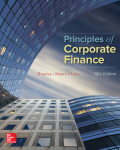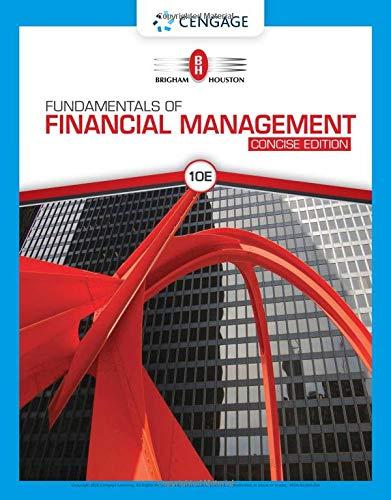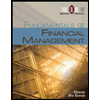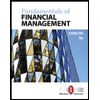
EBK PRINCIPLES OF CORPORATE FINANCE
12th Edition
ISBN: 9781259358487
Author: BREALEY
Publisher: MCGRAW HILL BOOK COMPANY
expand_more
expand_more
format_list_bulleted
Textbook Question
Chapter 16, Problem 20PS
Repurchases and EPS Many companies use stock repurchases to increase earnings per share. For example, suppose that a company is in the following position:

The company now repurchases 200,000 shares at $200 a share. The number of shares declines to 800,000 shares and earnings per share increase to $12.50. Assuming the price–earnings ratio stays at 20, the share price must rise to $250. Discuss.
Expert Solution & Answer
Want to see the full answer?
Check out a sample textbook solution
Students have asked these similar questions
Hello tutor solve this question and financial accounting question
I need help with this problem and financial accounting question
I want the correct answer with financial accounting question
Chapter 16 Solutions
EBK PRINCIPLES OF CORPORATE FINANCE
Ch. 16 - Dividend payments In 2017, Entergy paid a regular...Ch. 16 - Dividend payments Seashore Salt Co. has surplus...Ch. 16 - Repurchases Look again at Problem 2. Assume...Ch. 16 - Repurchases An article on stock repurchase in the...Ch. 16 - Company dividend policy Here are several facts...Ch. 16 - Prob. 7PSCh. 16 - Information content of dividends What is meant by...Ch. 16 - Information content of dividends Does the good...Ch. 16 - Information content of dividends Generous dividend...Ch. 16 - Prob. 11PS
Ch. 16 - Payout policy in perfect capital markets Go back...Ch. 16 - Payout policy in perfect capital markets Go back...Ch. 16 - Payout policy in perfect capital markets Respond...Ch. 16 - Prob. 15PSCh. 16 - Repurchases and the DCF model Hors dAge...Ch. 16 - Repurchases and the DCF model Surf Turf Hotels is...Ch. 16 - Repurchases and the DCF model House of Haddock has...Ch. 16 - Repurchases and the DCF model Little Oil has 1...Ch. 16 - Repurchases and EPS Many companies use stock...Ch. 16 - Dividends and value We stated in Section 16-3 that...Ch. 16 - Payout and valuation Look back one last time at...Ch. 16 - Dividend clienteles Mr. Milquetoast admires Warren...Ch. 16 - Prob. 24PSCh. 16 - Payout and taxes Which of the following U.S....Ch. 16 - Prob. 26PSCh. 16 - Prob. 27PSCh. 16 - Prob. 28PSCh. 16 - Dividend policy and the dividend discount model...Ch. 16 - Prob. 30PS
Knowledge Booster
Learn more about
Need a deep-dive on the concept behind this application? Look no further. Learn more about this topic, finance and related others by exploring similar questions and additional content below.Similar questions
- I need assistance with this financial accounting questionarrow_forwardGiven the following information concerning a convertible bond: a. What is the current yield of this bond? ANSWER: 4.8% b. What is the value of the bond based on the market price of the common stock? ANSWER: $864 c. What is the value of the common stock based on the market price of the bond? ANSWER: $38.52 d. What is the premium in terms of stock that the investor pays when he or she purchases the convertible bond instead of the stock? ANSWER: $176 e. Nonconvertible bonds are selling with a yield to maturity of 7 percent. If this bond lacked the conversion feature, what would the approximate price of the bond be? ANSWER: $817 f. What is the premium in terms of debt that the investor pays when he or she purchases the convertible bond instead of a nonconvertible bond? ANSWER: $223 g. If the price of the common stock should double, would the price of the convertible bond double? Briefly explain your answer. ANSWER: At least $1,728 h. If the price of the common stock should decline by 50…arrow_forwardI need help with financial accounting questionarrow_forward
- Agreee or disagree with post The temporary value of money (TVM) is an important concept in finance. TVM states that the money available now is worth more than the same amount in the future. This is because money can earn interest over time. A key assumption of this model is that money will obtain consistent performance. This assumption helps people make decisions about savings, investment and spending. For example, knowing that money grows can motivate people to save for future objectives. However, this model has limitations. The assumption of consistent yields may not be true in real life due to changes in the market or economic conditions. Therefore, although the temporal value of money is useful for planning, it is essential to consider the risks and uncertainties in financial decision making. Agree or disagree with postarrow_forwardWhat is the time value of money concept? Explain one of the assumptions behind the TVM model. How does this assumption limit the application of this model?arrow_forwardagree or disagree with post TVM or time value of money is the suggestion that todays currency will be more profitable in the future. This concept comes from the action of investing, which produces returns and in short monopolizes the investment. One of the biggest assumptions behind the TVM model is that the economic conditions will remain steady enough to produce a profit for the consumer. This model does not account for inflation, fluctuation of the market, and even different government actions which can impact the economy. This limits the application of the model because it is not accurate and due it being based off of a growing interest rate only which we all know is not the case. Investing can be unpredictable and ever changing so that needs to be taken into account in models such as these. agree or disagree with postarrow_forward
- How are HRISs changing how companies manage their compensation and benefit plans?arrow_forward3. A bond's yield to maturity (YTM) is:A. The coupon rateB. The rate of return required by investorsC. The market price of the bondD. The par value of the bondarrow_forwardNeed help The time value of money concept suggests:A. A dollar today is worth less than a dollar tomorrowB. Money loses value over time due to inflationC. A dollar today is worth more than a dollar in the futureD. Interest has no effect on present valuearrow_forward
arrow_back_ios
SEE MORE QUESTIONS
arrow_forward_ios
Recommended textbooks for you
 Fundamentals Of Financial Management, Concise Edi...FinanceISBN:9781337902571Author:Eugene F. Brigham, Joel F. HoustonPublisher:Cengage Learning
Fundamentals Of Financial Management, Concise Edi...FinanceISBN:9781337902571Author:Eugene F. Brigham, Joel F. HoustonPublisher:Cengage Learning Fundamentals of Financial Management, Concise Edi...FinanceISBN:9781285065137Author:Eugene F. Brigham, Joel F. HoustonPublisher:Cengage Learning
Fundamentals of Financial Management, Concise Edi...FinanceISBN:9781285065137Author:Eugene F. Brigham, Joel F. HoustonPublisher:Cengage Learning Fundamentals of Financial Management, Concise Edi...FinanceISBN:9781305635937Author:Eugene F. Brigham, Joel F. HoustonPublisher:Cengage Learning
Fundamentals of Financial Management, Concise Edi...FinanceISBN:9781305635937Author:Eugene F. Brigham, Joel F. HoustonPublisher:Cengage Learning EBK CONTEMPORARY FINANCIAL MANAGEMENTFinanceISBN:9781337514835Author:MOYERPublisher:CENGAGE LEARNING - CONSIGNMENT
EBK CONTEMPORARY FINANCIAL MANAGEMENTFinanceISBN:9781337514835Author:MOYERPublisher:CENGAGE LEARNING - CONSIGNMENT Intermediate Financial Management (MindTap Course...FinanceISBN:9781337395083Author:Eugene F. Brigham, Phillip R. DavesPublisher:Cengage Learning
Intermediate Financial Management (MindTap Course...FinanceISBN:9781337395083Author:Eugene F. Brigham, Phillip R. DavesPublisher:Cengage Learning

Fundamentals Of Financial Management, Concise Edi...
Finance
ISBN:9781337902571
Author:Eugene F. Brigham, Joel F. Houston
Publisher:Cengage Learning

Fundamentals of Financial Management, Concise Edi...
Finance
ISBN:9781285065137
Author:Eugene F. Brigham, Joel F. Houston
Publisher:Cengage Learning

Fundamentals of Financial Management, Concise Edi...
Finance
ISBN:9781305635937
Author:Eugene F. Brigham, Joel F. Houston
Publisher:Cengage Learning

EBK CONTEMPORARY FINANCIAL MANAGEMENT
Finance
ISBN:9781337514835
Author:MOYER
Publisher:CENGAGE LEARNING - CONSIGNMENT

Intermediate Financial Management (MindTap Course...
Finance
ISBN:9781337395083
Author:Eugene F. Brigham, Phillip R. Daves
Publisher:Cengage Learning
What Are Stock Buybacks and Why Are They Controversial?; Author: TD Ameritrade;https://www.youtube.com/watch?v=2O4bmcliaog;License: Standard youtube license